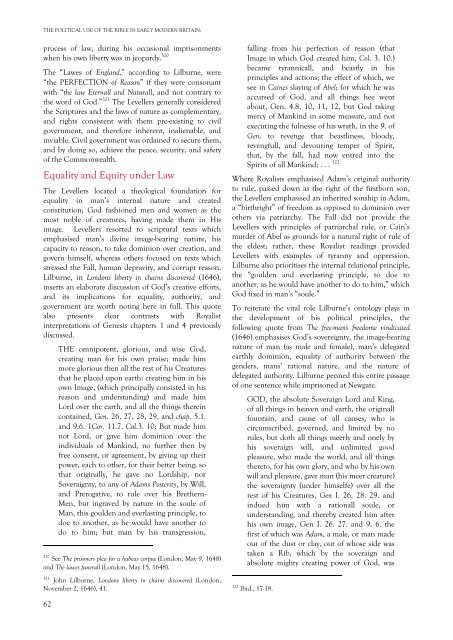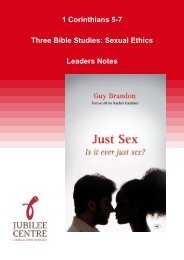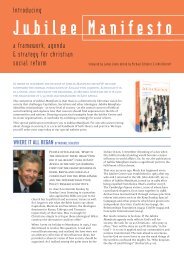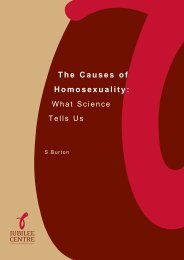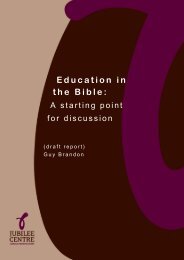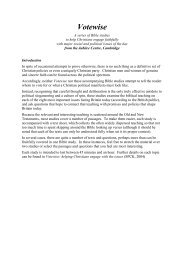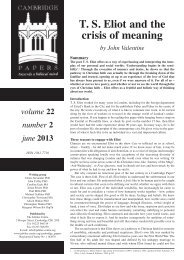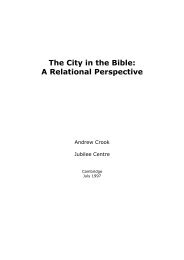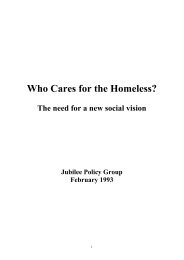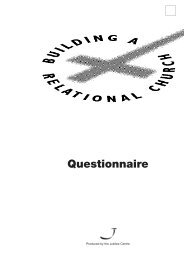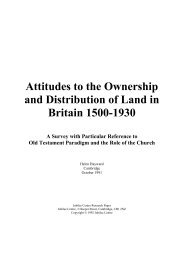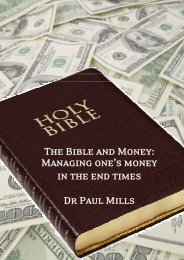Report Template - Jubilee Centre
Report Template - Jubilee Centre
Report Template - Jubilee Centre
Create successful ePaper yourself
Turn your PDF publications into a flip-book with our unique Google optimized e-Paper software.
THE POLITICAL USE OF THE BIBLE IN EARLY MODERN BRITAIN:<br />
process of law, during his occasional imprisonments<br />
when his own liberty was in jeopardy. 320<br />
The “Lawes of England,” according to Lilburne, were<br />
“the PERFECTION of Reason” if they were consonant<br />
with “the law Eternall and Naturall, and not contrary to<br />
the word of God.” 321 The Levellers generally considered<br />
the Scriptures and the laws of nature as complementary,<br />
and rights consistent with them pre-existing to civil<br />
government, and therefore inherent, inalienable, and<br />
inviable. Civil government was ordained to secure them,<br />
and by doing so, achieve the peace, security, and safety<br />
of the Commonwealth.<br />
Equality and Equity under Law<br />
The Levellers located a theological foundation for<br />
equality in man’s internal nature and created<br />
constitution; God fashioned men and women as the<br />
most noble of creatures, having made them in His<br />
image. Levellers resorted to scriptural texts which<br />
emphasised man’s divine image-bearing nature, his<br />
capacity to reason, to take dominion over creation, and<br />
govern himself, whereas others focused on texts which<br />
stressed the Fall, human depravity, and corrupt reason.<br />
Lilburne, in Londons liberty in chains discovered (1646),<br />
inserts an elaborate discussion of God’s creative efforts,<br />
and its implications for equality, authority, and<br />
government are worth noting here in full. This quote<br />
also presents clear contrasts with Royalist<br />
interpretations of Genesis chapters 1 and 4 previously<br />
discussed.<br />
THE omnipotent, glorious, and wise God,<br />
creating man for his own praise; made him<br />
more glorious then all the rest of his Creatures<br />
that he placed upon earth: creating him in his<br />
own Image, (which principally consisted in his<br />
reason and understanding) and made him<br />
Lord over the earth, and all the things therein<br />
contained, Gen. 26, 27, 28, 29. and chap. 5.1.<br />
and 9.6. 1Cor. 11.7. Col.3. 10; But made him<br />
not Lord, or gave him dominion over the<br />
individuals of Mankind, no further then by<br />
free consent, or agreement, by giving up their<br />
power, each to other, for their better being; so<br />
that originally, he gave no Lordship, nor<br />
Soveraignty, to any of Adams Posterity, by Will,<br />
and Prerogative, to rule over his Brethern-<br />
Men, but ingraved by nature in the soule of<br />
Man, this goulden and everlasting principle, to<br />
doe to another, as he would have another to<br />
do to him; but man by his transgression,<br />
320<br />
See The prisoners plea for a habeas corpus (London, May 9, 1648)<br />
and The lawes funerall (London, May 15, 1648).<br />
321<br />
John Lilburne, Londons liberty in chains discovered (London,<br />
November 2, 1646), 41.<br />
falling from his perfection of reason (that<br />
Image in which God created him, Col. 3. 10.)<br />
became tyrannicall, and beastly in his<br />
principles and actions; the effect of which, we<br />
see in Caines slaying of Abel; for which he was<br />
accursed of God, and all things hee went<br />
about, Gen. 4.8, 10, 11, 12. but God taking<br />
mercy of Mankind in some measure, and not<br />
executing the fulnesse of his wrath, in the 9. of<br />
Gen. to revenge that beastliness, bloody,<br />
revengfull, and devouring temper of Spirit,<br />
that, by the fall, had now entred into the<br />
Spirits of all Mankind; . . . 322<br />
Where Royalists emphasised Adam’s original authority<br />
to rule, passed down as the right of the firstborn son,<br />
the Levellers emphasised an inherited sonship in Adam,<br />
a “birthright” of freedom as opposed to dominion over<br />
others via patriarchy. The Fall did not provide the<br />
Levellers with principles of patriarchal rule, or Cain’s<br />
murder of Abel as grounds for a natural right of rule of<br />
the eldest; rather, these Royalist readings provided<br />
Levellers with examples of tyranny and oppression.<br />
Lilburne also prioritises the internal relational principle,<br />
the “goulden and everlasting principle, to doe to<br />
another, as he would have another to do to him,” which<br />
God fixed in man’s “soule.”<br />
To reiterate the vital role Lilburne’s ontology plays in<br />
the development of his political principles, the<br />
following quote from The free-mans freedome vindicated<br />
(1646) emphasises God’s sovereignty, the image-bearing<br />
nature of man (as male and female), man’s delegated<br />
earthly dominion, equality of authority between the<br />
genders, mans’ rational nature, and the nature of<br />
delegated authority. Lilburne penned this entire passage<br />
of one sentence while imprisoned at Newgate.<br />
GOD, the absolute Soveraign Lord and King,<br />
of all things in heaven and earth, the originall<br />
fountain, and cause of all causes, who is<br />
circumscribed, governed, and limited by no<br />
rules, but doth all things meerly and onely by<br />
his soveraign will, and unlimited good<br />
pleasure, who made the world, and all things<br />
thereto, for his own glory, and who by his own<br />
will and pleasure, gave man (his meer creature)<br />
the soveraignty (under himselfe) over all the<br />
rest of his Creatures, Gen I. 26. 28. 29. and<br />
indued him with a rationall soule, or<br />
understanding, and thereby created him after<br />
his own image, Gen I. 26. 27. and 9. 6. the<br />
first of which was Adam, a male, or man made<br />
out of the dust or clay, out of whose side was<br />
taken a Rib, which by the soveraign and<br />
absolute mighty creating power of God, was<br />
322<br />
Ibid., 17-18.<br />
62


